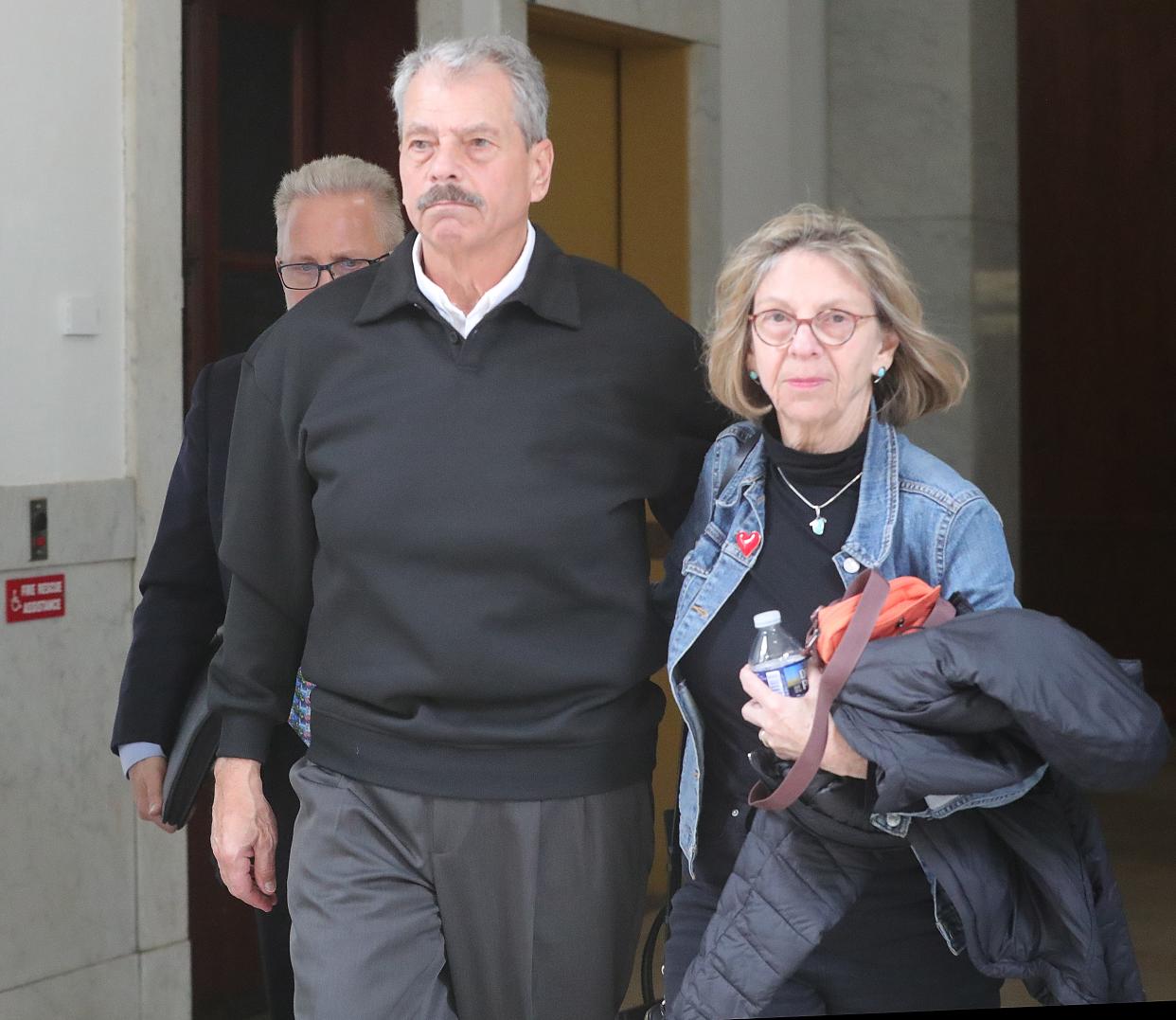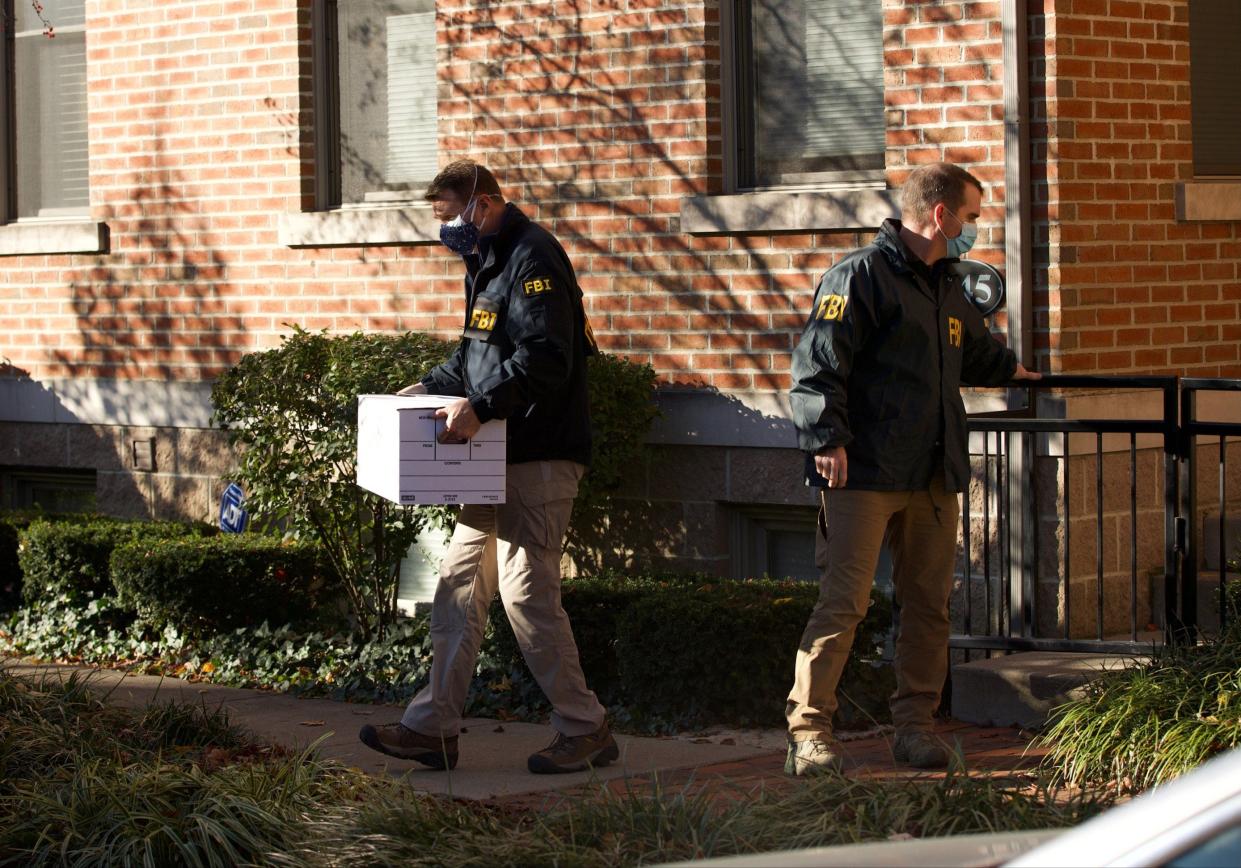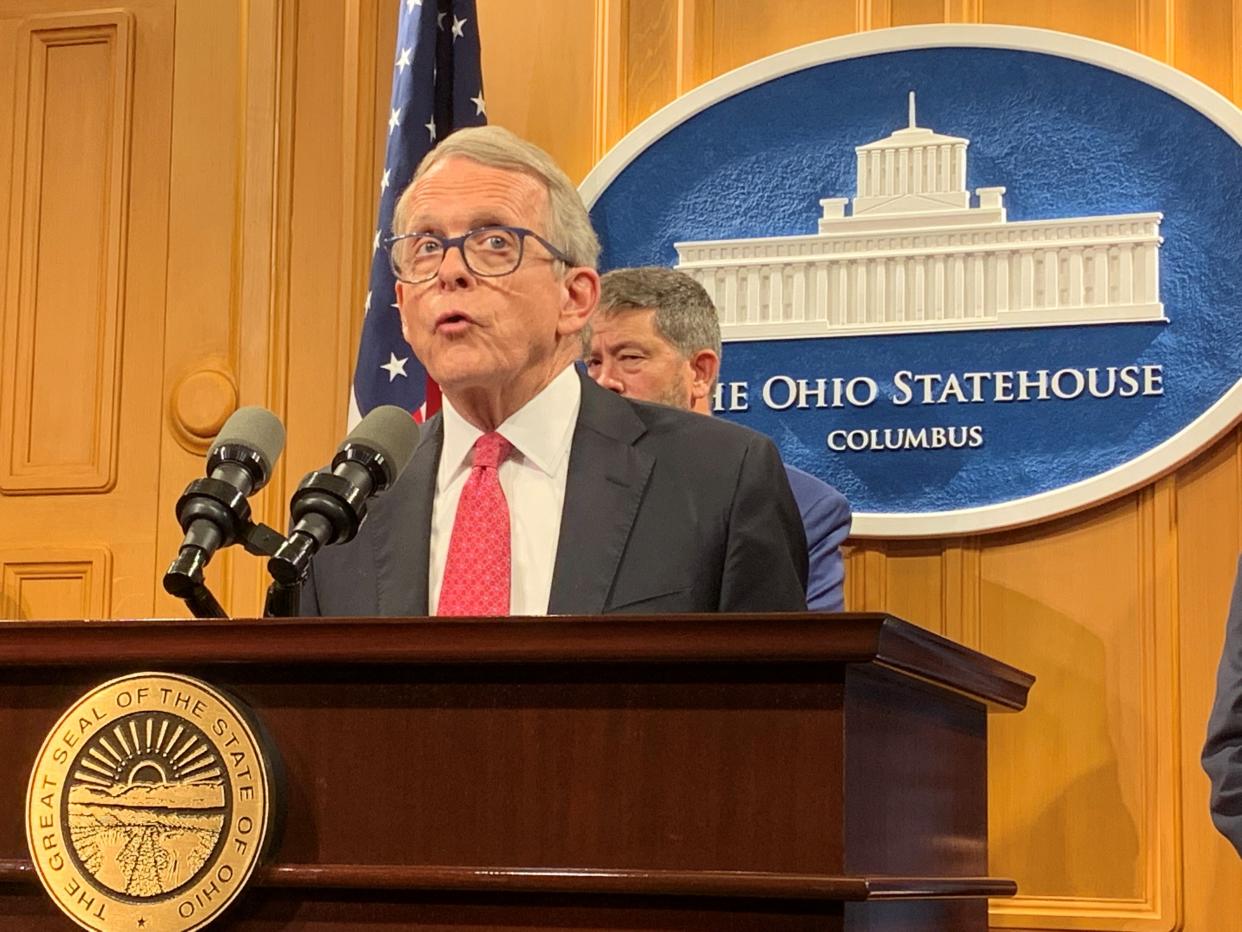Unanswered questions: How Ohio's top utility regulator got caught up in pay-to-play scandal

Editor's note: This story includes a discussion of suicide. If you or someone you know needs help, the national suicide and crisis lifeline in the U.S. is available by calling or texting 988. There is also an online chat at 988lifeline.org.
In the early hours of Nov. 16, 2020, FBI agents wearing navy blue jackets and COVID-19 masks removed box after box from the Columbus condominium of Ohio's top utility regulator, Sam Randazzo.
It was the first time Randazzo, then chairman of the Public Utilities Commission of Ohio, was implicated in a pay-for-play scandal at the Ohio Statehouse. Randazzo resigned days later and began waiting for the other shoe to drop.
Randazzo pleaded not guilty to federal and state charges, but he will never see the inside of a courtroom to prove it. On April 9, Randazzo was found dead of a suspected suicide in a Columbus warehouse he owned.
The bribery scheme involved a desperate utility, Akron-based FirstEnergy, paying politicians and the politically connected for favors: legislation to bail out two nuclear plants, a way to recession-proof its profits and a delayed rate case that saved the company money.
The fallout has been wide-reaching. One of Ohio's top politicians, former House Speaker Larry Householder, was sentenced to 20 years in prison and former Ohio Republican Party chairman Matt Borges is serving five years in prison. FirstEnergy has fired top executives and paid a $230 million fine.
In December 2023, federal prosecutors charged Randazzo with bribery and fraud. The case centered on $4.3 million that FirstEnergy paid Randazzo shortly before Ohio Gov. Mike DeWine appointed him as the state's top utility regulator; Ohio Attorney General Dave Yost filed state charges in February.
Randazzo's death is the final chapter in the story of a man at the pinnacle of his profession brought down by accusations that he was swindling clients and selling his integrity to the highest bidder: FirstEnergy.
Randazzo's attorney Richard Blake said his client "was tarred and feathered in the media by the prosecutors in this case before having an opportunity to address the charges."
Too close to FirstEnergy?
Randazzo, 74, was the smartest man in every energy policy room. He could be a polarizing figure, beloved by those he advocated for and despised by those he fought against in the cutthroat world of utility regulation.
"You'll find no one, no one in Columbus who will say he was not a smart guy. He was a very smart guy," said Rep. Bill Seitz, R-Green Township, who said he relied on Randazzo's expertise, among others, when crafting legislation.
Randazzo had decades of experience, starting in the 1970s as a staff member at the PUCO and later as an attorney helping large industrial energy users negotiate deals with utilities such as FirstEnergy, Duke Energy and American Electric Power. Randazzo was consistently ranked among the nation's top utility lawyers.
Randazzo had a hand in much of Ohio's energy law, including eliminating energy efficiency mandates on large energy users; axing renewable energy standard requirements; and charging consumers for two coal plants owned by the Ohio Valley Electric Corporation.
So, it wasn't shocking when DeWine named Randazzo to serve as PUCO chairman in February 2019 − a role that acts like a referee between utilities and Ohioans paying electric bills. Randazzo told lawmakers he planned to retire to Naples, Florida. Instead, the DeWine administration recruited him to forgo retirement and serve at the PUCO.
At the time of his appointment, Randazzo's most vocal opponents were environmental activists wary of his anti-renewable energy stances.
But behind the scenes, fellow Republicans had warned DeWine that Randazzo was too close to FirstEnergy. DeWine didn't listen, a decision he now calls a mistake.
It would take years and several indictments to reveal how close Randazzo was to FirstEnergy.

A $4.3 million payment from 'Hurricane Chuck'
FirstEnergy paid Randazzo's companies $22 million between 2010 and 2019, including a $4.3 million payment weeks before DeWine picked Randazzo to lead the PUCO, according to FirstEnergy's deferred prosecution agreement. In July 2021, FirstEnergy admitted it bribed Randazzo and Householder.
FirstEnergy paid Randazzo the $4.3 million after a meeting at his German Village condo in on Dec. 18, 2018. Then-FirstEnergy CEO Chuck Jones and then-senior Vice President Michael Dowling stopped by after a dinner at The Athletic Club of Columbus with DeWine, Lt. Gov.-elect Jon Husted and lobbyist Josh Rubin.
"We're going to get this handled, paid in full, no discount," Jones texted Randazzo after leaving the condo. "Don't forget about us or Hurricane Chuck may show up on your doorstep! Of course, no guarantee he won't show up anyway."
Jones then sent an image of a snake emerging from a hurricane.
"Made me laugh − you guys are welcome anytime and anywhere I can open a door," Randazzo replied. "I think I said this last night but just in case − if asked by the administration to go for the Chair spot, I would say yes."
If Randazzo's case had gone to trial, his attorneys would have argued that the $4.3 million was a legitimate payment for the remainder of a consulting agreement − not a bribe. "It's just as plausible that it was a legitimate buyout as that it was a bribe," Seitz said. "We don't know. I guess you'll never know."
The snake meme wasn't the only text message that revealed a casual relationship between Randazzo and FirstEnergy executives. Randazzo once texted them an image of himself dressed as a superhero and surrounded by terms like "Randazzler" and "Poppa Dazzo." He also dressed as Rudolph in a group picture with FirstEnergy leaders wearing Santa suits.

Passing House Bill 6
Once Randazzo was installed as chairman of the PUCO, prosecutors say he worked diligently on House Bill 6, an energy overhaul that included a $1 billion bailout for two nuclear plants owned by a FirstEnergy subsidiary. The company was "bleeding cash" over the plants and needed a fix from lawmakers in Columbus or Washington D.C., one executive testified in a federal trial.
Behind the scenes, Randazzo advocated for a larger subsidy, opposed an audit of the bailout and crafted language to recession-proof some of FirstEnergy's profits, according to court documents. Ohio lawmakers passed House Bill 6 in July 2019, and DeWine signed it the day it hit his desk.
That same day, Jones sent Randazzo a picture of Mount Rushmore that substituted the faces of Randazzo, Dowling, Boich Companies' Matt Evans and FirstEnergy lobbyist Ty Pine for the American presidents. It included the phrase: "HB6 F--- ANYBODY WHO AIN'T US."
“Ha − I get the small space again," Randazzo texted Jones, who replied: "Not in my book − your the only one without a big head."
Seitz said there's nothing wrong with Randazzo working on House Bill 6 while chairman of the PUCO. It makes sense to consult the DeWine administration on pending legislation. "To the extent (that) Sam informed the decisions around House Bill 6, I don't consider that suspect in any way shape or form because that's what they should be doing."
A few months later, prosecutors say Randazzo delayed a rate case that would have hurt FirstEnergy financially. After the PUCO scrapped the filings, Jones texted Randazzo an image of FirstEnergy's stock increasing and wrote: "My Mom taught me to say Thank you.”
A slow trickle builds and Randazzo resigns
FirstEnergy celebrated its victories in 2019. But in July 2020, federal prosecutors arrested Householder, Borges and three others connected to House Bill 6. The feds described the scandal as the biggest pay-to-play scheme in the state's history. "This case is in a league of its own," one FBI special agent said.
In October 2020, FirstEnergy fired Jones, Dowling and a third executive following an internal review. More details trickled out the following month. The FBI searched Randazzo's home. A business filing revealed the executives paid a state utility regulator more than $4 million in early 2019. Randazzo resigned from the PUCO.
Randazzo's resignation letter detailed his accomplishments at the PUCO. He advocated for eliminating the "too-utility-friendly" electric security plans and accompanying riders that charge "captive customers" for businesses' expenses.
"He has done very, very good work as chair," DeWine said when Randazzo resigned to avoid being a distraction. "(Randazzo) felt that this was the best thing for him to do.”

'Well-lawyered theft'
It would take prosecutors three years to charge Randazzo with any crime. When they finally did, the indictment would accuse Randazzo of cheating Ohio consumers and his clients.
Prosecutors allege Randazzo brokered deals between his client, the Industrial Energy Users-Ohio, and utilities for discounts that the average Ohioan couldn't access.
IEU-Ohio, a trade group of large industrial energy users, would drop its opposition to the utilities' proposed rate hikes, and the utility would offer the companies a refund or discount. Side deals are legal if disclosed but remain controversial.
Prosecutors accused Randazzo of skimming millions from a side deal between FirstEnergy and IEU-Ohio by working for both sides of the arrangement.
In a different side deal with American Electric Power in 2016, Randazzo was accused of stealing $1.2 million from his IEU-Ohio clients by listing one of his shell companies as an IEU-Ohio member. State prosecutors called it "a well-lawyered theft."
Cases closed
While awaiting criminal charges, Randazzo waged a legal battle over access to his money and property. Yost, the state's attorney general, argued that Randazzo shouldn't be able to sell off or transfer houses as the former utility regulator did in early 2021. The Ohio Supreme Court agreed with Yost in early 2024.
Court records offer a glimpse into the weight that lengthy litigation and criminal charges had placed on a once well-respected attorney. However, suicide is a complicated decision that is only understood by the individual and sometimes those closest to them.
Randazzo appeared before a Summit County judge in February along with Jones and Dowling, two former FirstEnergy executives also accused of bribery. The judge ordered all three to wear ankle monitors, something Randazzo's attorney called “downright mean,” according to a Cleveland.com report.
In mid-March, Randazzo's attorney wanted to file medical records about why his client shouldn't have to wear an ankle monitor. The state disclosed that "a mental health professional has opined that the GPS monitor that Randazzo is required to wear as a condition of his bond has negative health consequences."
The judge never had a chance to decide on that request. Randazzo was found dead on April 9.
Randazzo is the second person accused in the pay-to-play scandal to die by suicide. Longtime lobbyist Neil Clark, who had also pleaded not guilty to the charges against him, died in Florida in March 2021.
After years of accusations and waiting, prosecutors will dismiss the criminal charges against Randazzo. The cases will be closed without convictions for the investigators or vindication for Randazzo.
"(Randazzo) was a brilliant guy. Very few people in Ohio knew more about utility law than him," Seitz said. "I believe this is all a great, great tragedy for him and for his family."
Jessie Balmert and Laura Bischoff are reporters for the USA TODAY Network Ohio Bureau, which serves the Columbus Dispatch, Cincinnati Enquirer, Akron Beacon Journal and 18 other affiliated news organizations across Ohio.
This article originally appeared on Cincinnati Enquirer: How Ohio's top utility regulator got caught up in pay-to-play scandal
